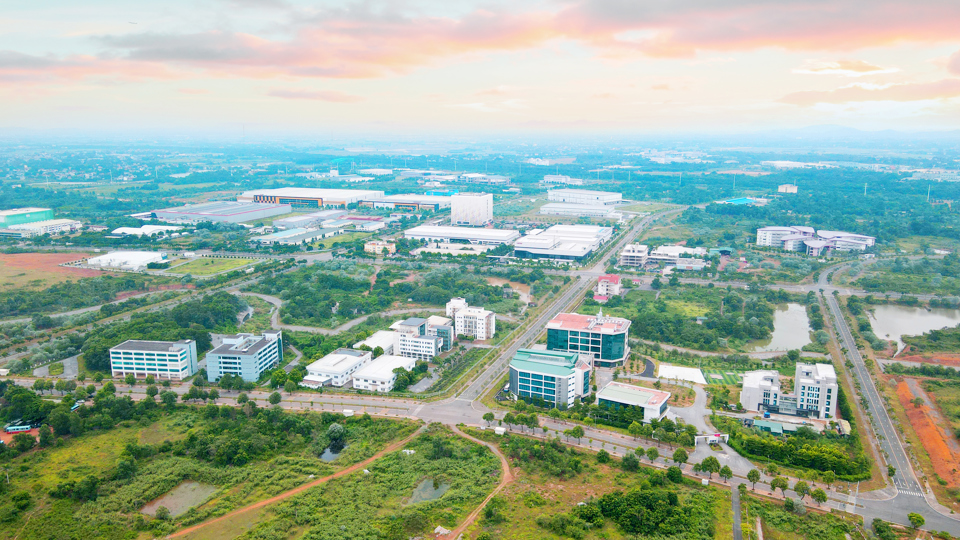Amended Capital Law expected to foster science and technology
Science and technology and education development are major concerns among legislators.
The amended Capital Law must be synchronized with others to boost the development of sciences and technologies across the capital city, national legislators said today (May 28).
| The Hoa Lac Hi-Tech Park in Hanoi's Thach That District. Photo: Pham Hung/The Hanoi Times |
At the 7th Congress of the 15th National Assembly, legislator Phan Duc Hieu of the Thai Binh Province's delegation urged policymakers to ensure the amended law was feasible and compatible with others.
He said that Article 24 on selecting project contractors at the Hoa Lac Hi-Tech Park should clarify who will finalize the list of projects.
Hieu recommended that lawmakers review the amended law so it can suit the Land Law, as project bidding often goes along with land use auctioning.
He also suggested that lawmakers alternate some of the terminologies in the amended law to make it more straightforward, transparent, and precise.
Deputy Ly Thi Lan of the Ha Giang provincial delegation highly agreed with the content of the amended Capital Law, which will create huge momentum for Hanoi's science and technology sector.
She said that the law would facilitate robust, sustainable development for all hi-tech parks in the capital city, especially the Hoa Lac Hi-Tech Park after it has been laid in place by the Hanoi administration.
Lan also acknowledged the previously-mentioned Article 24, which empowers the Hanoi People's Committee to finalize decisions concerning city-based hi-tech parks' development, expansion, and operation.
The deputy highly corresponded with the principles of offering high-tech projects with the highest incentives and solutions to attract high-quality individuals to work at the high-tech parks.
She shared other ideas of the policymakers, such as enabling the city government to use the budget and support Hoa Lac Hi-Tech Park to perfect local infrastructures and rental houses for workers and specialists and giving the park's management board the authority to make their own decisions on specific matters on investment, employment, land management, and construction.
Ta Dinh Thi, a deputy from the Hanoi delegation, credited policymakers for improving the content of the amended Capital Law after receiving opinions at the 6th Congress in October 2023 and at the NA deputies' fifth meeting in late March.
The NA deputy went along with the items that allow universities, vocational schools, and other State-funded science and technology facilities in Hanoi to form their businesses. He also supported the idea of these establishments sending their employees to work at such member businesses.
According to Thi, the rules would realize the Party and Politburo's resolutions that aim to hasten science and technology development, put them into practice, and foster the growth of the citywide ecosystem comprising universities, research institutes and enterprises.
"Such policy now becomes popular amid a fast-changing technological world, shorter product life cycles, and a booming university-rooted startup community," he said.
The Hanoi legislator urged the law-writing team to keep reviewing and aligning the law with others, especially those on intellectual property protection, enterprises, and science and technology, to guarantee the law's feasibility.
According to the latest resolution of the Politburo, which was released last week, science and technology are poised to be one of Hanoi's founding layers for robust socio-economic growth.
The capital city houses the Hoa Lac Hi-Tech Park in Thach That District, some 30km from the central metropolis. The park was inaugurated in 1998, and it was handed over to the Hanoi People's Committee from the Ministry of Science and Technology last year.
Education and training in the spotlight
During the meeting today (May 28), NA deputies also discussed the amended Capital Law's principles on education and training.
| Hanoi students attended the closing ceremony of the academic year 2023-2024 last week. Photo: The Hanoi Times |
Tran Thi Van, from Bac Ninh Province, said that Hanoi needs to invest in high-quality education and training establishments, especially K12 schools, to meet local demand.
According to Van, the capital has all the advantages of converging high-quality laborers and connecting to the world. Therefore, the education and training sector is the key to building Hanoi into a national hub that drives the national digital transformation, innovation and global integration.
“Developing high-quality training facilities and human resources is the capital’s responsibility, not only for its own interests but also for the whole nation,” she said.
Nguyen Anh Tri, a member of the Hanoi delegation, said that the public has well received the development of high-quality schools.
He advised that the lawmakers provide an accurate definition and criteria for the word “high-quality” to make sure the schools comply with the standard. Tri also urged the writers to agree on the terminologies so that the law is effectively implemented.
Sharing the same view, Deputy Nguyen Thi Nga from the Quang Binh Province delegation said that the education and training sector, defined by the amended law, differs from the one regulated by existing rules.
“The term ‘high-quality education and training establishment’ is unclear, unclarified,” she said. “There is few reporting on the obstacles and bottlenecks regarding Hanoi’s learning activities while the amended Capital Law provides no ideas about high-quality, multi-level school standards.”
She cited that local schools have been overloaded in recent years due to rapid urbanization, and Hanoi is in a shortage of classrooms to make education generally accessible for all.
“The development of high-quality schools may increase tuition to a new level. This may discriminate against students based on their expenditures,” Nga warned.
“Hanoi should target building more nationally standardized schools, more kindergartens, and more public schools to make education affordable for all children,” she said.












